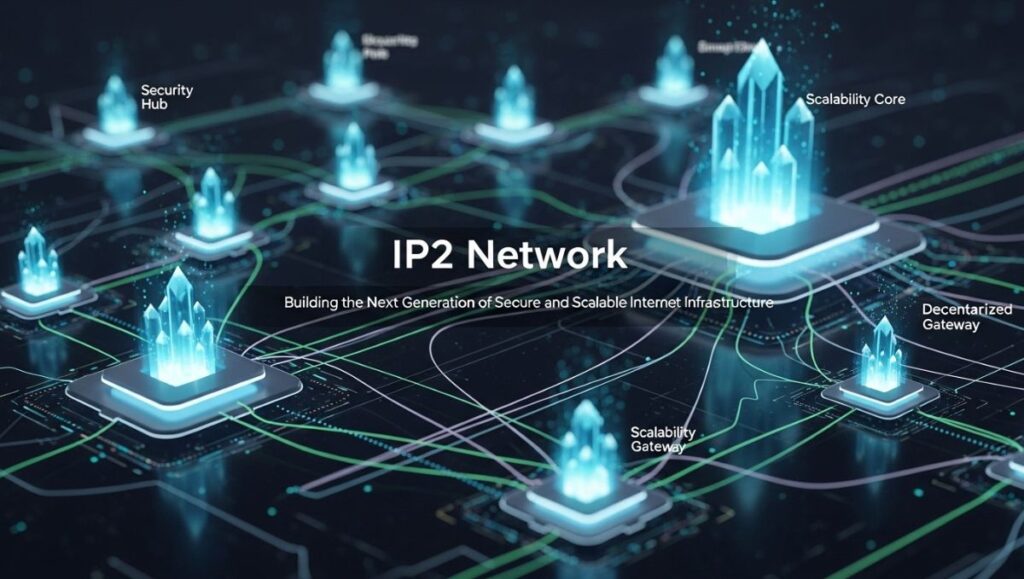In today’s hyperconnected world, networks are the foundation of nearly every aspect of modern life — from social communication and entertainment to business operations and global trade. As data flows across billions of connected devices, the need for faster, more secure, and more intelligent networking systems has never been greater.
This is where IP2 Network emerges as a transformative concept. Designed to enhance the traditional Internet Protocol framework, IP2 Network represents a next-generation digital networking ecosystem built for scalability, speed, and security in the age of AI, IoT, and cloud computing.
By rethinking how data is transmitted, authenticated, and managed, IP2 Network aims to create a smarter, safer, and more decentralized internet, capable of meeting the demands of modern digital infrastructure.
What Is IP2 Network?
At its core, IP2 Network refers to a next-generation Internet Protocol system — an evolution beyond the limitations of IPv4 and IPv6. The term “IP2” can be understood as Internet Protocol version 2.0, representing a new architecture that focuses on enhanced data security, intelligent routing, and decentralized connectivity.
While IPv4 and IPv6 focus primarily on addressing and data delivery, IP2 Network adds new layers of intelligence, encryption, and automation to improve how data packets are exchanged between users, applications, and devices.
In simpler terms, IP2 Network is the future of internet communication — a framework that not only transfers information but also understands, secures, and optimizes it in real-time.
The Evolution from IPv4 and IPv6 to IP2 Network
To understand the innovation behind IP2 Network, it’s helpful to look at the progression of Internet Protocols:
-
IPv4 (Internet Protocol version 4) was the original addressing system that powered the early internet, using 32-bit addresses. However, with only about 4.3 billion possible IPs, it quickly became limited as devices multiplied.
-
IPv6 (Internet Protocol version 6) expanded this system to 128-bit addresses, allowing trillions of unique IPs — more than enough for modern needs. Yet, IPv6 primarily improved scalability, not intelligence or security.
-
IP2 Network represents the next leap — not just an addressing protocol but an intelligent networking framework that integrates AI-driven routing, blockchain authentication, and adaptive security to create a more autonomous and efficient digital ecosystem.
Core Features of IP2 Network
1. Intelligent Data Routing
Traditional internet protocols rely on static routing tables and centralized control. IP2 Network introduces AI-driven routing, allowing data packets to choose the fastest, safest path automatically based on real-time conditions such as network congestion, latency, and cybersecurity threats.
2. End-to-End Encryption by Default
Security is at the heart of IP2 Network. Every data packet is encrypted at the protocol level — not just during transmission but throughout the communication chain — reducing risks of interception, tampering, or identity spoofing.
3. Decentralized Architecture
Unlike traditional centralized networks that depend on large data hubs, Network leverages decentralized nodes. This structure improves fault tolerance, speeds up data delivery, and prevents single points of failure or control.
4. Blockchain-Based Authentication
Each connection within the Network can be verified using blockchain identity records, ensuring authenticity between devices and users. This eliminates common cybersecurity vulnerabilities such as phishing and DNS spoofing.
5. Smart QoS (Quality of Service) Management
Network employs machine learning algorithms to allocate bandwidth dynamically. It prioritizes critical data, ensuring that essential communications (such as healthcare or financial transactions) maintain consistent performance even during heavy traffic.
6. Backward Compatibility
To ensure smooth adoption, IP2 Network maintains compatibility with IPv4 and IPv6 systems, allowing organizations to migrate gradually without disrupting existing infrastructures.
How IP2 Network Works
1. Node-to-Node Communication
In IP2 Network, every device functions as a smart node capable of direct communication with others without relying on centralized servers. Nodes authenticate each other using digital certificates stored on a blockchain ledger.
2. Smart Routing Engine
The AI routing engine continuously analyzes network conditions, rerouting data packets through the most efficient and secure pathways. This allows the network to adapt automatically to real-time conditions such as congestion or cyberattacks.
3. Encrypted Data Transmission
Each packet is encrypted at the source and remains protected throughout its journey. Even if intercepted, unauthorized entities cannot decode or alter its contents without cryptographic keys.
4. Decentralized Data Storage
Rather than depending on a single data center, Network can distribute data fragments across multiple nodes. This enhances data redundancy and resilience against outages or targeted attacks.
Applications of Network
The potential use cases for Network span across multiple sectors, each benefiting from its speed, security, and decentralization.
1. Cybersecurity Infrastructure
IP2 Network’s blockchain-backed authentication and zero-trust design make it ideal for building secure communication frameworks in government, military, and enterprise systems.
2. Internet of Things (IoT)
With billions of IoT devices requiring low-latency, high-security connections, Network can provide autonomous device-to-device communication without bottlenecks or vulnerabilities.
3. Cloud Computing and Edge Networks
In cloud environments, Network enables dynamic resource allocation and faster data synchronization between data centers and edge devices.
4. Financial Services and Blockchain
Financial institutions can use Network to secure transactions, verify digital identities, and reduce fraud risks — all while maintaining compliance with privacy standards.
5. Smart Cities and Transportation
From traffic management to connected vehicles, IP2 Network allows real-time coordination between sensors, cameras, and infrastructure systems, improving efficiency and safety.
6. Healthcare Systems
Medical institutions can exchange sensitive patient data securely and instantaneously, ensuring compliance with HIPAA and other privacy regulations.
Advantages of IP2 Network
1. Enhanced Security
IP2 Network’s encryption-first approach protects data integrity and user identity, making it nearly immune to common attacks like DDoS, spoofing, and man-in-the-middle exploits.
2. Decentralized Efficiency
By removing central intermediaries, the network reduces latency, improves redundancy, and increases overall performance.
3. AI-Driven Optimization
Machine learning models continuously analyze patterns and optimize data flow for maximum efficiency, self-healing from disruptions or overloads.
4. Future-Proof Scalability
The modular design of IP2 Network allows easy integration with future technologies like quantum encryption, 6G, and metaverse platforms.
5. Sustainable Networking
IP2 Network minimizes redundant transmissions and optimizes power usage, contributing to greener, more sustainable IT infrastructure.
Challenges and Limitations
While IP2 Network holds immense promise, it also faces several challenges during its implementation phase:
-
Adoption Barriers: Transitioning from IPv4/IPv6 to IP2 infrastructure requires new standards and coordination among global network providers.
-
Computational Overhead: Advanced encryption and blockchain verification can increase CPU and memory usage.
-
Regulatory Compliance: Cross-border data transmission may face restrictions under privacy laws like GDPR.
-
Interoperability: While backward compatibility is a goal, legacy hardware may require upgrades to support IP2’s full capabilities.
-
Standardization: Global consensus on IP2 protocols must be established to ensure universal interoperability.
Nonetheless, ongoing research and development efforts are actively addressing these challenges to make IP2 more viable at scale.
IP2 Network and the Role of Artificial Intelligence
AI isn’t just a supporting feature of Network — it’s a driving force. Through predictive analytics and adaptive algorithms, AI enables the network to:
-
Detect and isolate cyber threats in real time.
-
Optimize bandwidth distribution automatically.
-
Predict user behavior to pre-cache frequently accessed data.
-
Manage multi-path routing to ensure zero downtime.
This level of automation transforms Network into a self-aware digital ecosystem, capable of evolving without human intervention.
Security Innovations in IP2 Network
1. Quantum-Resistant Encryption
To future-proof against quantum computing threats, IP2 Network incorporates post-quantum cryptography — ensuring that even quantum processors cannot break its encryption.
2. Blockchain-Based Identity Management
Every user or device on IP2 Network possesses a unique blockchain identity, ensuring accountability and eliminating anonymous threats.
3. Distributed Intrusion Detection
Each node monitors nearby activity patterns, forming a collaborative defense grid that detects anomalies across the network instantly.
4. Privacy-Preserving Data Sharing
IP2 Network enables confidential computing, allowing sensitive computations to occur within encrypted environments without exposing raw data.
Comparison: IP2 Network vs. Traditional Internet Protocols
| Feature | IPv4 / IPv6 | IP2 Network |
|---|---|---|
| Addressing | 32-bit / 128-bit | Smart, dynamic addressing with blockchain verification |
| Security | Dependent on external protocols (SSL/TLS) | Built-in encryption and authentication |
| Architecture | Centralized | Decentralized, peer-to-peer |
| Routing | Static | AI-driven dynamic routing |
| Scalability | Hardware-limited | Cloud-native and modular |
| Fault Tolerance | Limited | Self-healing network architecture |
| Integration | Manual setup | API-based automation |
This comparison highlights IP2 Network’s potential as the next generation of internet infrastructure, capable of supporting the digital economy of the future.
The Future of IP2 Network
The coming decade will likely witness Network becoming the standard framework for secure, scalable communication. With the rise of smart cities, connected vehicles, 6G networks, and edge computing, the world needs a networking protocol that can adapt intelligently and defend autonomously.
Future innovations in Network may include:
-
Integration with quantum key distribution (QKD) for ultimate encryption.
-
AI-based predictive routing algorithms to eliminate latency entirely.
-
Autonomous digital ecosystems, where services self-coordinate through decentralized governance.
As IP2 Network matures, it could reshape the internet itself — turning it into a living, learning network that grows smarter with every packet of data transmitted.
Conclusion
The IP2 Network is more than just an upgrade to existing internet protocols — it’s a complete reimagining of how connectivity should work in the 21st century. By combining AI intelligence, blockchain verification, and decentralized design, Network delivers the foundation for a safer, faster, and more efficient digital world.
As organizations, governments, and individuals increasingly rely on digital systems, the transition to intelligent networking frameworks like Network is inevitable. It represents the next chapter in the evolution of the internet — one defined by autonomy, transparency, and trust.






